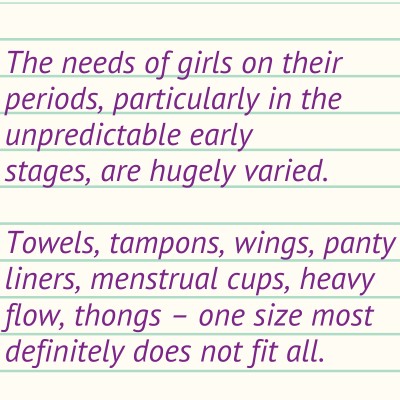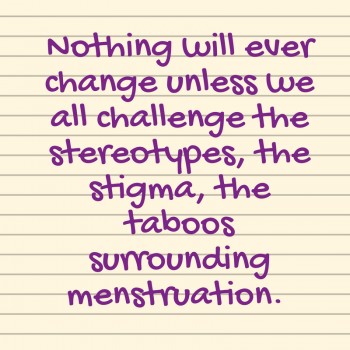Engender blog
Free period products, when and where we need them
In this blog, Engender's Communications and Engagement Manager, Alys Mumford, talks about our continuing work to ensure access to free period products.
A common trope seen in film and TV is a woman being caught short in a nightclub toilet and being met with dozens of new friends proffering tampons and pads. And while I do have experience on both sides of this scene, I also have memories of sneaking a pad up the sleeve of my school jumper when going to the loo, wearing a hoodie tied round my waist on a freezing day in case I was leaking, using a code word to talk about tampons on holiday (‘cereal bars’ in case you’re wondering, and no I can’t remember why), and stressing out when a borrowed tampon had an applicator which I’d never used before.
Lack of access to appropriate period products can also lead to girls missing school, women having to take days off from paid work, people using unhygienic alternatives such as newspaper, and withdrawing from leisure activities.
GUEST POST: Bridging the gender health gap
Women and girls face signiï¬cant barriers to good mental and physical health. Historic lack of funding for, or professional focus on, health issues that disproportionately affect women, or affect women differently to men, can mean that these issues are not equally accommodated for in health services or awareness-raising initiatives. This anonymous guest blog explores gendered health inequalities and what progress is being made on bridging the gender health gap.
-400.png)
It took roughly six years of medical appointments before a tentative diagnosis of chronic pain – a condition that, by definition, is pain lasting longer than three months despite treatment. Part of the issue was that the pain, among other symptoms, had never really been treated; it was repeatedly misdiagnosed, from appendicitis to pregnancy, and continuously dismissed as stress or growing pains.
It was a strange relief to eventually be referred to an endometriosis specialist and women’s heath physiotherapist session, though the relief was short-lived – while I did receive some pain management, the former concluded that the pain did not appear severe enough to suggest the presence of the condition, nor warrant further investigation, and the latter prescribed mindfulness. Like many others, until recently I had never heard of endometriosis – despite its high prevalence rate and top ranking in the NHS’ 20 most painful conditions. I also found that, like many other people, my experience of healthcare was not unique. In recent years, there has been increasing awareness and recognition of such experiences as symptomatic of a wider issue: a gender disparity in medical research, knowledge and treatment that has amounted to a gender health gap.
Blood, cramps, and dignity - why we need free period products now
Last Wednesday, Monica Lennon MSP launched her Period Products (Free Provision) (Scotland) Bill at the Scottish Parliament. Engender's Communications and Engagement Manager, Alys Mumford, was there to show support. Here, she blogs about the importance of having free period products for everyone.

I’ve always supported the idea of free period products instinctively, and being at the launch of Monica Lennon’s Period Products (Free Provision) (Scotland) Bill really confirmed for me that it’s an issue which is vital for women and girls’ equality in Scotland.
Guest post: Period shaming is a serious problem

This week we have been joined in the new Engender office by Livi, a student on a work experience placement from Holy Rood RC High. While here, Livi has written a piece on period shaming, an issue which she has previously researched at school and feels strongly should be more widely covered.
Downloads
 Engender Briefing: Pension Credit Entitlement Changes
From 15 May 2019, new changes will be introduced which will require couples where one partner has reached state pension age and one has not (‘mixed age couples’) to claim universal credit (UC) instead of Pension Credit.
Engender Briefing: Pension Credit Entitlement Changes
From 15 May 2019, new changes will be introduced which will require couples where one partner has reached state pension age and one has not (‘mixed age couples’) to claim universal credit (UC) instead of Pension Credit.
 Engender Parliamentary Briefing: Condemnation of Misogyny, Racism, Harassment and Sexism
Engender welcomes this Scottish Parliament Debate on Condemnation of Misogyny, Racism, Harassment and Sexism and the opportunity to raise awareness of the ways in which women in Scotland’s inequality contributes to gender-based violence.
Engender Parliamentary Briefing: Condemnation of Misogyny, Racism, Harassment and Sexism
Engender welcomes this Scottish Parliament Debate on Condemnation of Misogyny, Racism, Harassment and Sexism and the opportunity to raise awareness of the ways in which women in Scotland’s inequality contributes to gender-based violence.
 Gender Matters in Social Security: Individual Payments of Universal Credit
A paper calling on the Scottish Government to automatically split payments of Universal Credit between couples, once this power is devolved to the Scottish Parliament.
Gender Matters in Social Security: Individual Payments of Universal Credit
A paper calling on the Scottish Government to automatically split payments of Universal Credit between couples, once this power is devolved to the Scottish Parliament.
 Gender Matters Manifesto: Twenty for 2016
This manifesto sets out measures that, with political will, can be taken over the next parliamentary term in pursuit of these goals.
Gender Matters Manifesto: Twenty for 2016
This manifesto sets out measures that, with political will, can be taken over the next parliamentary term in pursuit of these goals.
 Scottish NGO Briefing for UN Special Rapporteur on Violence Against Women
Joint briefing paper for the UN Rapporteur on Violence Against Women.
Scottish NGO Briefing for UN Special Rapporteur on Violence Against Women
Joint briefing paper for the UN Rapporteur on Violence Against Women.

Newsletter
Sign up to receive our newsletter here:
Sign up to our mailing list
Receive key feminist updates direct to your inbox: